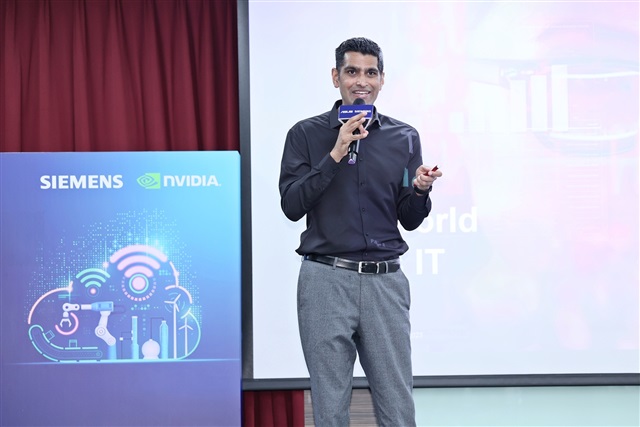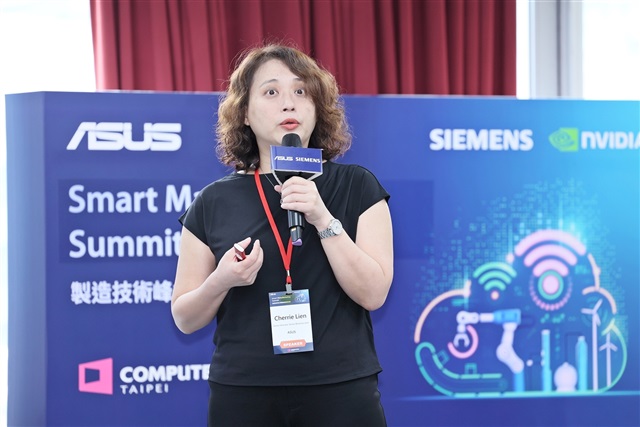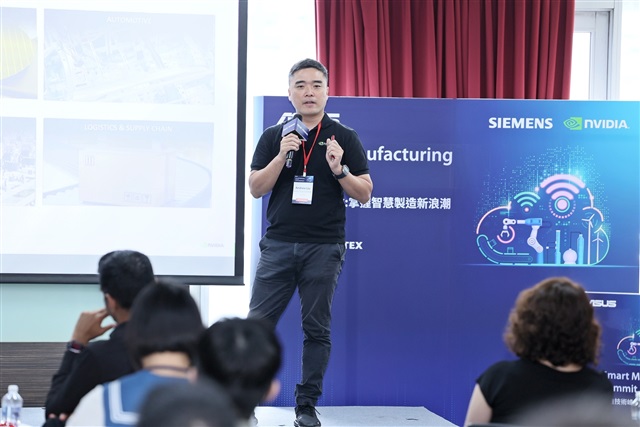How to leverage digital technologies, such as artificial intelligence (AI), to enhance the operational efficiency and product quality of factory production lines, reduce labor and costs, then achieve the urgent goal of net zero for sustainability is the most crucial concern for manufacturing companies today. To achieve smart manufacturing, it is essential to rely on collaborative efforts from interdisciplinary industry players, combining their expertise and resources. And all the discussions in the "Smart Manufacturing Summit" during Computex 2023 are around related topics.
In the Summit, Speakers from ASUS, SIEMENS, and NVIDIA shared their solutions and relevant experiences in supporting the transformation and upgrading of the manufacturing industry.
Digital Transformation is imminent
The world today is changing as it has never changed before. The rapidly changing market poses urgent challenges for industries. Customers not only focus on basic requirements such as product safety, intelligent features, and high quality but also have new demands, such as personalized. Whether it's buying a pair of sneakers or a car, most consumers want something unique. If manufacturers can provide personalized solutions based on customer preferences, they gain a competitive advantage in the market. This means that manufacturing companies accustomed to standardized mass production must make changes to their operational models.
Manufacturers also face challenges from the goals of sustainability. According to statistics from World Economic Forum, global industrial production accounts for 37% of total energy consumption and contributes 30% of global greenhouse gas emissions. "Our resources are finite, so the industry must do more with less. Digitalization, automation, and the intelligent use of data are key to meet this challenge."
Ramkrishna sees "Digital transformation" and "Net Zero transformation" are interconnected priorities for countries and enterprises to cope with the challenges today. "10 years ago I was talking to my customers in Taiwan about the topic of digital transformation. But somehow this topic never really accelerated. For the last one or two years this is massively accelerating, but what has been even more interesting or more positive is this topic around the net zero transformation."
"For example, some of our customers in Taiwan are small and medium machine builders. Their customers in the US or Europe are asking them questions about how efficient the machine is, and what the common footprint of it. Because this is CapEx, which is gonna be sitting somewhere there for the next 25 years. " But just getting the data and getting transparent to the first step is already a big bottleneck for them, taking digital transformation is imminent.
What Ramkrishna sees is everybody's loving IT and wants to get there, but everybody's running on OT. And the interesting part is sort of these two guys are not talking to each other very often. As an automation supplier, this is also the biggest challenge, and getting these guys connected is what SIEMENS is doing.
SIEMENS is assisting Taiwanese companies in addressing these challenges from three directions: first, transform Taiwan's industries business model, balancing sustainability and circularity with other business objectives; second, tackling the complexity of Taiwan's industrial ecosystem, breaking down silos across industrial processes and ecosystems; third, assisting local customers to get from data to decisions, turning many sources of data into actionable sustainability indicators.
Combining digital twin technology with software-as-a-Service (SaaS) on the cloud, and application development solutions, SIEMENS' Xcelerator open platform help manufacturers reduce costs while continuously optimizing. The company also offers the SIMATIC series industrial computers (IPC) Tensor Box, which incorporates NVIDIA GPUs and integrates Edge AI capabilities. Combined with their own 5G router and ASUS' 5G network infrastructure, it enables tighter integration between IT and OT, facilitating the digitization and net-zero transformation of industrial processes.
Challenges of Enabling Smart Manufacturing
As Alber Wu, Division Director of ASUS' Server Business Unit mentioned, the first challenge to enable smart manufacturing is smooth integration between IT and OT. However, people from IT and OT departments have different mindsets, goals, and priorities, have the alignment between them is critical. Another challenge is having the convergence between lots of the systems on both the IT and OT sides.
"That's why we provide solutions from the cloud to the edge," he highlighted ASUS' industrial-grade servers for Edge AI inference and 5G network applications, operating at -5°C to 55°C, support GPUs in short-depth chassis, tool-less and cable-less design. "Those edge servers can help to provide better convergence, and they are scalable, effective, also flexible for end customers. We aim to provide the seamless integration of IT and OT systems."
"In the past years, cloud computing is a big topic, and we see a lot of hyperscale data centers. We run workloads in the cloud. We talk about public cloud, private cloud, hybrid cloud. But now Edge computing is booming because of AI technology and 5G technology. It brings the benefit of real-time, reduced latency per source of bandwidth, to make the device more connected at edge side and far rage." Cherrie Lien, Senior Director of Product Marketing in ASUS Server Business Unit added.
She also mentioned ASUS' software for supporting edge to cloud automation, such as ASUS Control Center, a centralized IT management tool of monitoring and controlling all types of ASUS' computing systems. And AISVision, an AIO toolkit uses ASUS AI techniques for the application of computer vision, offers a flexible training and inference architecture, for building the smart manufacturing scenario.
Virtual Factory is the Solution for Smart Manufacturing
AI plays such a critical role in smart manufacturing, it might be the reason why both SIEMENS and ASUS are in collaboration with their partner, NVIDIA. The company's platform has become essential in the digital transformation journey of numerous manufacturers. "But don't make it wrong, this is more of a collaboration platform. We work with SIEMENS, we work with ASUS, and we work with the whole ecosystem, to make it a transformation platform for all." Andrew Liu, Senior Data Scientist of NVIDIA, emphasized that it is not an achievement by NVIDIA alone, but a collaborative effort with ecosystem partners.
Liu said the global manufacturing industry is a $45 trillion business, with 10 million factories, and the enterprises are facing unprecedented external pressures, including high inflation, supply chain disruptions, mass labor shortages, raising energy prices, and all the sustainability requirements. And NVIDIA believes that virtual factories are key for enabling sustainable manufacturing.
"We already saw a lot of big names, such as BMW, Mercedes-Benz, and GM, started to build up their virtual factories, if you are a vender trying to deal with them, trying to build the digital twin of your factory would be one way you can have the same language, and consistency." Liu added, "you build a factory not just for yourself, you build a factory for your customers, right? And you need to build a factory more sustainable, collaborate with so many different stakeholders with so many different perspectives. If you can have a virtual factory, you can have a much rapid experimentation about how the factory going to lay out, what kind of robotics fit in what kind of operation, and what AI automation needed to tap into your factory to make it more efficient. You can accelerate your decision-making process, reduce the weight, and optimize the process, the idea, or the vision."
For all the reasons above, NVIDIA wants to work with customers to build software-defined, data-driven factories. "First, we need to make them connected. Whether you deploy the factory on the cloud or the hybrid environment, it needs to be cloud-native, based on new technologies like Microsoft's container." Liu mentioned NVIDIA AI Enterprise, cloud-native AI software with an extensive library of full-stack software, including AI solution workflows, frameworks, pre-trained models, and infrastructure optimization that accelerates the data science pipeline and streamlines the development and deployment of predictive AI models to automate essential processes and gain rapid insights from data.
And NVIDIA Omniverse, an AI-enabled, physically simulated, and industrial-scale virtual-world engine that enables full-fidelity live digital twins. Last October, NVIDIA announced to partner with SIEMENS, to connect Omniverse and SIEMENS Xcelerator platforms to enable the industrial metaverse with physics-based digital models from SIEMENS and real-time AI from NVIDIA, speed companies' process of making decisions.
NVIDIA and SIEMENS share a common vision that digital twins that can deliver productivity and process improvements across the production and product lifecycles. And companies of all sizes will be able to employ digital twins with real-time performance data; create innovative industrial IoT solutions; leverage actionable insights from analytics at the edge or in the cloud; and tackle the engineering challenges of tomorrow by making visually rich, immersive simulations more accessible.
Holistic Industrial Security is Essential
Last, but not least, there is one major concern that worries users the most about building a smart, connected factory: cybersecurity.
"The more you connect, the more cybersecurity threats you have. But the answer is not to connect lesser, you have to connect a lot more." SIEMENS' Ramkrishna explained, in factories, there're a lot of old machines, if you are not connecting all those, the risks are much higher, but this also gets a lot more complicated. "This is where we are helping our customers with different methods. We're using the so-called defense-in-depth approach."
SIEMENS believes, only a holistic industrial security concept can be effective against cyber threats, it needs considerations on three dimensions. First is the security of plant itself, needs physical access protection, security policies, and monitoring; the second is network security, the solutions include setup cell protection, perimeter network, trusted zones, or usage of firewalls and VPN tools; the third is system integrity, practices are hardening systems, building strategies of patch management, authentication, and access protection.
Ramkrishna concluded, "We consult our customers on how they should look at their plant security, their network security, making sure that everything is working there. All our products are developed according to the latest protocols to make sure that it is no threats are there. We're considering our customers a lot on this topic and it's the most important part of our products, it is not something that even selling."

Robert Chin, General Manager, Server Business Unit, ASUS

Aditya Ramkrishna, General Manager of Digital Industries, SIEMENS Taiwan

Cherrie Lien, Senior Director, Server Business Unit, ASUS

Andrew Liu, Senior Data Scientist, NVIDIA



